
Journal of Ovonic Research
metrics 2024
Bridging Theory and Application in Material Technologies.
Introduction
Journal of Ovonic Research is a distinguished publication dedicated to advancing the fields of electronic, optical, and magnetic materials. Published by VIRTUAL CO PHYSICS SRL, this journal offers a platform for researchers to share innovative findings and developments that push the boundaries of technology and materials science. With an ISSN of 1842-2403 and an E-ISSN of 1584-9953, it provides an important service to the academic community, particularly within Romania and beyond. Despite its recent inception in 2011, the journal has gained traction in the academic landscape, reflecting a Q4 quartile ranking in crucial categories such as Electronic, Optical and Magnetic Materials, as well as in Physics and Astronomy. The Scopus rankings further underscore its positioning, ranking within the 25th to 37th percentile across various disciplines, making it a valuable resource for professionals and students alike. Although the journal currently operates on a non-open access basis, it remains committed to exploring the latest advancements in materials science, encouraging interdisciplinary collaboration and fostering a deeper understanding of surface, coating, and film technologies. As the field evolves, Journal of Ovonic Research stands as a beacon for scholarly communication, bridging the gap between research and practical application.
Metrics 2024
 0.20
0.20 0.90
0.90 1.10
1.10 19
19Metrics History
Rank 2024
Scopus
IF (Web Of Science)
JCI (Web Of Science)
Quartile History
Similar Journals

Optoelectronics and Advanced Materials-Rapid Communications
Fostering Innovation through Rapid Research in Materials Science.Optoelectronics and Advanced Materials-Rapid Communications is a pivotal journal in the field of optoelectronics, specializing in the rapid dissemination of original research and reviews concerning advanced materials and their applications. Published by the NATL INST OPTOELECTRONICS in Romania, this journal has been instrumental for researchers and professionals since its inception in 2008. With an E-ISSN of 2065-3824, it offers a platform for innovative studies across various disciplines, focusing on both theoretical and practical advancements in electrical and electronic engineering, as well as electronic, optical, and magnetic materials. Although currently categorized in the Q4 quartile based on the 2023 Scopus rankings, the journal is dedicated to enhancing its visibility and citation impact among the scientific community. By facilitating open access to cutting-edge research, Optoelectronics and Advanced Materials-Rapid Communications not only addresses the needs of emerging scholars and industry professionals but also contributes to the broader discourse on materials science. As it continues to evolve through 2024 and beyond, the journal remains an essential resource for those committed to advancing knowledge in optoelectronic technologies.
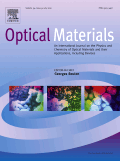
OPTICAL MATERIALS
Transforming Ideas into Optical SolutionsOPTICAL MATERIALS is a peer-reviewed journal published by Elsevier, focusing on the intricate field of optical materials within various scientific domains including atomic and molecular physics, electronic engineering, and chemistry. With an impact factor indicative of its relevance, it ranks in the Q2 category across multiple areas such as Electrical and Electronic Engineering, and Inorganic Chemistry, highlighting its critical position in advancing research and innovation. Established in 1992 and continuing its contribution until 2024, this journal serves as a vital resource for researchers and professionals aiming to disseminate significant findings in material sciences, particularly those related to optical properties and applications. While it does not offer open access, the journal remains essential for academia and industry alike, ensuring the continued exchange of valuable knowledge in this rapidly evolving field.
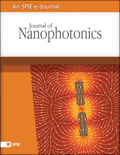
Journal of Nanophotonics
Illuminating the Future of NanotechnologyThe Journal of Nanophotonics, published by SPIE-SOC Photo-Optical Instrumentation Engineers, is an esteemed platform dedicated to advancing the field of nanotechnology through pioneering research in photonics. Since its inception in 2007, this journal has become instrumental in disseminating innovative findings and fostering collaborative discussions, especially in the domains of Condensed Matter Physics, Electronic, Optical and Magnetic Materials, and Nanoscience and Nanotechnology. Currently ranked within the Q3 category across these fields, it serves as a vital resource for academics, industry professionals, and students keen on exploring the multifaceted applications and implications of nanophotonic technologies. With its convergence set to continue until 2024, the journal offers a non-open-access model, ensuring rigorous peer-review standards and high-quality publications that contribute to the global body of knowledge.

Materials Chemistry Frontiers
Fostering Breakthroughs in Materials ChemistryMaterials Chemistry Frontiers, published by the esteemed Royal Society of Chemistry, stands as a leading journal in the realm of materials science and chemistry, with an impressive Q1 ranking in both Materials Chemistry and Materials Science categories as of 2023. This open-access journal, operating from the United Kingdom, offers a platform for researchers, professionals, and students to disseminate high-quality, impactful research. With its E-ISSN 2052-1537, the journal is dedicated to publishing cutting-edge articles, reviews, and research communications that explore innovative materials and their applications, fostering a comprehensive understanding of the complex interplay between materials and their chemical properties. With consistent rankings in the Scopus metrics, being positioned at the 25th percentile among 317 in the Materials Chemistry category, it highlights its pivotal role in advancing the field. The journal thrives on contributions that broaden the scope of knowledge from 2017 to 2024 and beyond, solidifying its status as an essential resource for contemporary research in materials science.

Crystals is a premier open-access journal, published by MDPI since 2011, that focuses on the multidisciplinary fields of chemical engineering, condensed matter physics, inorganic chemistry, and materials science. With its E-ISSN 2073-4352, the journal is headquartered in Switzerland, and actively contributes to the global scientific community by facilitating the dissemination of high-quality research. Ranking in the Q2 quartile across multiple categories, including Chemical Engineering (miscellaneous) and Materials Science (miscellaneous) for 2023, Crystals provides a platform for innovative studies that span from fundamental research to practical applications. The journal's commitment to open access ensures that groundbreaking findings are readily available to researchers, professionals, and students alike, fostering an environment of collaboration and knowledge sharing that is essential in advancing the scientific understanding of crystalline materials.
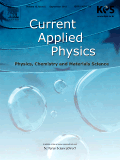
CURRENT APPLIED PHYSICS
Transforming Theoretical Concepts into Real-World Solutions.Current Applied Physics is a leading journal published by Elsevier, specializing in the dynamic fields of Physics and Materials Science. With an ISSN of 1567-1739 and an E-ISSN of 1878-1675, this journal focuses on the latest advancements and applications of physics principles in various practical domains. Operating from the innovative hub of Amsterdam, Netherlands, Current Applied Physics occupies a significant niche in the scientific community, evidenced by its Q2 ranking in both the Physics and Astronomy and Materials Science categories for the year 2023, along with impressive Scopus rankings that highlight its relevance in the fields of General Physics and General Materials Science. The journal's scope encompasses a wide range of topics, fostering interdisciplinary collaboration and facilitating the exchange of knowledge among researchers, professionals, and students. Each issue features peer-reviewed articles that contribute to the understanding and application of physical sciences, making it an essential resource for those aiming to stay at the forefront of research and innovation in applied physics.

Journal of Nanoelectronics and Optoelectronics
Advancing Knowledge in Nanoscale ElectronicsJournal of Nanoelectronics and Optoelectronics is a premier peer-reviewed journal published by AMER SCIENTIFIC PUBLISHERS that showcases cutting-edge research in the fields of electrical engineering, nanoelectronics, and optoelectronic materials. Established in 2006 and spanning through to 2017, this journal provides a platform for scientists and engineers to share their latest findings, developments, and innovations. Although coverage has been discontinued in Scopus, it retains an regional impact within its field, ranking #388 out of 654 in Electrical and Electronic Engineering and #156 out of 219 in Electronic, Optical, and Magnetic Materials. The journal is crucial for those seeking to advance their knowledge in nanoscale electronic components and optoelectronic devices, making it an essential resource for researchers, professionals, and students committed to this dynamic area of study. While the journal is not open access, it remains a significant contributor to the scholarly discourse surrounding next-generation electronic technologies and materials.
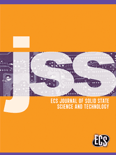
ECS Journal of Solid State Science and Technology
Exploring Innovations in Electronic, Optical, and Magnetic MaterialsECS Journal of Solid State Science and Technology, published by the Electrochemical Society, is a prominent journal dedicated to the advancement of research in the field of electronic, optical, and magnetic materials. With an ISSN of 2162-8769 and an E-ISSN of 2162-8777, this journal has established a significant presence since its inception in 2012, spanning critical developments in solid-state science that are essential for innovative technologies. Operating within the United States and recognized for its global outreach, it holds a respectable Q3 category ranking in the materials science category as of 2023, reflecting its commitment to high-quality research and its role in bridging theoretical and applied aspects of materials science. Researchers, professionals, and students alike will find vital information and cutting-edge studies that further the understanding and applications of solid-state technologies. The journal is accessible to an extensive audience, making it an invaluable resource for those engaged in the ever-evolving landscape of materials science.
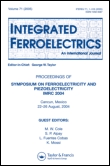
INTEGRATED FERROELECTRICS
Pioneering Insights in Ceramics and ElectronicsINTEGRATED FERROELECTRICS is a prominent academic journal published by Taylor & Francis Ltd, focusing on the interdisciplinary study of ferroelectric materials and their applications. Since its inception in 1992, it has provided a platform for high-quality research and innovative findings within fields such as ceramics and composites, condensed matter physics, and electrical engineering. Despite currently holding a Q4 quartile ranking across several categories—including Ceramics and Composites and Electrical and Electronic Engineering—the journal plays a crucial role in disseminating knowledge and fostering collaboration among scientists and engineers dedicated to advancing ferroelectric technology. With an increasing emphasis on the practical applications of electronic and optical materials, INTEGRATED FERROELECTRICS offers valuable insights for researchers, providing them with a repository of knowledge that is essential for both academic exploration and practical implementation.

eScience
Pioneering Research for a Greener TomorroweScience, published by KEAI PUBLISHING LTD, is an innovative open-access journal that has rapidly established itself as a leading platform in the fields of Electrochemistry, Materials Chemistry, and Renewable Energy, Sustainability, and the Environment. Since its inception in 2021, eScience has garnered recognition for its high-quality research, achieving an impressive Q1 ranking in each of its primary categories as of 2023. With a remarkable Scopus ranking—placing it among the top percentile of journals in these disciplines—eScience serves as an essential resource for researchers and practitioners aiming to advance knowledge and application in sustainable practices and materials innovation. As an open-access journal, eScience supports widespread dissemination of vital research, ensuring accessibility for all, which is critical in addressing contemporary global challenges. The journal's commitment to fostering interdisciplinary dialogue and collaboration positions it as a cornerstone for those dedicated to pushing the boundaries of scientific discovery.